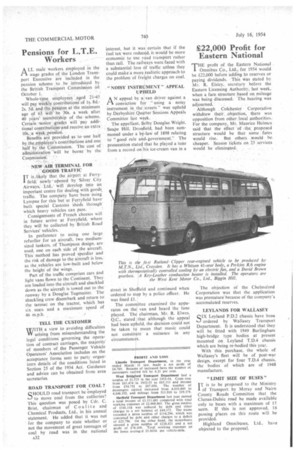Pensions for L.T.E. Workers
Page 34

If you've noticed an error in this article please click here to report it so we can fix it.
ALL male workers employed in the wage grades of the London Transport Executive are included in the pension scheme to be introduced by the British Transport Commission an October 1.
Whole-time employees aged 21-45 will pay weekly contributionS. of Is. 8d.2s. 5d. and the.Pension at the minimum age of 65 will be 30s. a week after 40 years' membership of the scheme. Certain •senior grades will pay additional contributions-and receive an extra 10s. a Week ,pension.
Benefits are provided as to one half by the_emplo.yee's contributions and one half by the 'Commission. Tire cost of administration will be borne by the Commission.
• NEW AIR TERMINAL FOR , GOODS TRAFFIC
IT is likely that the airport at Ferry1 field, newlyobened by Silver City Airways; Ltd.. will develop into an important centre for dealing with goods traffic. The company have been using Lympne for this but at Ferryfield have built special Customs Sheds through. which heavy vehicles can pass.
Consignments of French cheeses will in future arrive at Ferryfield, where they will be collected by British Road Services' vehicles.
In preference to using one large refueller for an aircraft, two mediumsized tankers. of Thompson design. are used, one on each side of the aircraft. This method has proved speedier and the risk of damage to the aircraft is less. as the vehiclesare low-built and below the height of the wings. Part of the traffic comprises cars and light vans flown to the Continent. They are loaded into the aircraft and shackled down as the aircraft is towed out to the runway by a Douglas Tugmaster. The Shackling crew disembark andreturn to the tarmac on the tractor, which has six seats and a maximum speed of 46 m.p.h.
TELL THE CUSTOMER . WITH a view to avoiding difficulties VI' arising from misunderstanding the legalconditions' governing the operation of contract carriages, the majority of members of the Passenger Vehicle Operators' Association includes on the acceptance forms sent to party organizers details of the conditions listed in Section 25 of the 1934 Act. Guidance and advice can be Obtained from area secretaries.
ROAD TRANSPORT FOR COAL?
SHOULD road transport be employed to move coal from the collieries? This question was posed by Cdr. C. Brist, chairman of Coalit e and Chemical Products. Ltd., in his annual statement. He added that it was not for the company to state whether or not the movement of great tonnages of coal by road was in the national
A32
interest, but it wasl certain that if the fuel tax were reduced. it would be more economic to use rqad transp-ort rather than rail. The railvyays were faced with a substantial loss qf traffic unless they could makea more kealistic approach to the problem of fright charges on coal.
"NOISY INSTRUMENT" APPEAL UPHELD
AN appeal by aj van driver against a conviction tor ,"using a noisy instrument inthe rStreeti " was upheld by-Derbyshire Quitter Sessions Appeals
Committee last w ek. . . .
The appellant. Selby Douglas Wright, Snape Hill. Dronfield j, had been summoned under a by-law of 1898 relating to"good rule and. government." The prosecution stated that he played a tune from a record on, his ice-cream van in a
street in Shel1eld and continued when ordered to st p by a police officer. He was fined £1.
The comMittee examined the apparatus on the van and heard the fune played. The chairman, Mr. R. Elwes, Q.C.. stated that although the appeal had been upheld, the decision could not be taken to mean thatmusic could not constitute a nuisance in any circumstances.




























































































